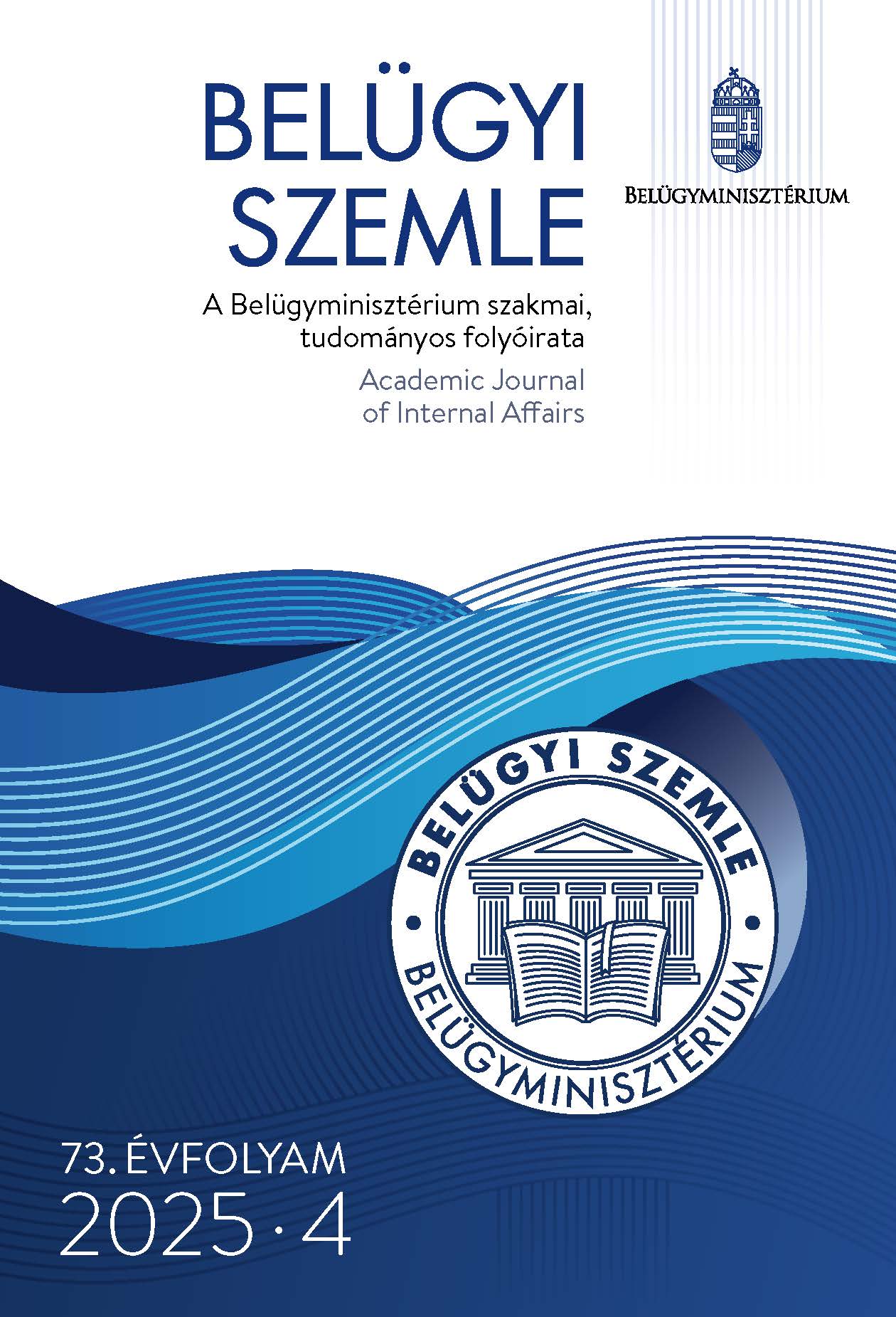Abstract
Aim: Both domestic and foreign literature focuses on the possibilities of making law enforcement careers attractive to young people, career motivation, increasing retention and reducing turnover (see e.g. Wilson & Grammich, 2009; Christián & Erdős, 2020). Recruitment and retention are therefore topical issues, and continuous in-depth research will help to understand attitudes towards career choice and motivation. As law enforcement sectors are transforming (problem-solving, strategic thinking, community-based policing), expectations of the future police officer are changing (Scrivner, 2006), but to tackle the problems that are prominent in our society - organised crime, terrorism, migration crisis - also require stronger policing responses (Kerezsi, 2020), and therefore higher education in law enforcement needs to respond to a variety of customer needs, with students choosing law enforcement careers for a variety of reasons and motivations. The aim of this research is to understand the main motivations and ideas behind the choice of a career in policing.
Methodology: In this paper we present the results of our questionnaire survey among students (N=168) enrolled full-time at the Faculty of Law Enforcement of the National University of Public Service in the academic year 2023-24.
Findings: The motivation of people choosing a career in law enforcement has been the subject of numerous surveys around the world. The basic scale of motives is provided by the work of Lester (1983), who organized it into 3 main clusters: pay and security (1), service (2), and power and status (3) (Lester, 1983). This work is drawn upon by a number of other studies on career choice (see e.g. Wu et al., 2009; Elntib & Milincic, 2021). All of these are well understood in our domestic study. In our research, we also sought to understand how candidates view police careers, what are the dominant motives behind their career choices, and to what extent these motives shape their perceptions of the profession and their identity as a professional.
Value: By monitoring the input base of police officer recruits, we can draw trend-like conclusions about career choice motivation and thus formulate new directions for recruitment. The career choice motives of Lester and other researchers can be found in our sample, and by understanding these motives we can gain a more complete picture of the potential for keeping police officers in the profession.
References
Cambareri, J. F., & Kuhns, J. B. (2018). Perceptions and perceived challenges associated with a hypothetical career in law enforcement: Differences among male and female college students. Police Quarterly, 21(3), 335–357. https://doi.org/10.1177/1098611118760862
Christián L., & Erdős Á. (2020). Vészharang és jubileum? A rendészeti felsőoktatás kilátásai, a tisztjelöltek toborzásának és életpályára állításának nehézségei. Belügyi Szemle, 68(12), 11–42. https://doi.org/10.38146/BSZ.2020.12.1
Christián L., Hautzinger Z., & Kovács G. (2021). A magyar rendészeti felsőoktatás jelene és jövője. Magyar Rendészet, 21(Különszám), 53–72. https://doi.org/10.32577/mr.2021.1.ksz.4
Clinkinbeard, S. S., Solomon, S. J., & Rief, R. M. (2021). Why did you become a police officer? Entry-related motives and concerns of women and men in policing. Criminal Justice and Behavior, 48(6), 715–733. https://doi.org/10.1177/0093854821993508
Cumming, E., Cumming, I., & Edell, L. (1965). Policeman as philosopher, guide and friend. Social Problems, 12(3), 276–286. https://doi.org/10.2307/798922
Elntib, S., & Milincic, D. (2020). Motivations for becoming a police officer: A global snapshot. Journal of Police and Criminal Psychology, 36(1), 1–9. https://doi.org/10.1007/s11896-020-09396-w
Erdős Á., & Magasvári A. (2023). A pénzügyőri hivatásválasztás hátterének kvalitatív vizsgálata. Neveléstudomány, 2023(2), 32–43. https://doi.org/10.21549/NTNY.41.2023.2.3
Fekete M., Bajnok A., & Hegedűs J. (2023). Akciókutatás a rendészeti felsőoktatásban: egy tantárgyfejlesztés reflexiója. Neveléstudomány: Oktatás, Kutatás, Innováció, 11(2), 20–31. https://doi.org/10.21549/NTNY.41.2023.2.2
Fekete M., Hegedűs J., Molnár K., Hlavacska G., & Molnár I. J. (2022). A magatartástudomány helye és a kompetenciafejlesztés lehetőségei a rendészeti felsőoktatásban. Belügyi Szemle, 70(10), 2029–2046. https://doi.org/10.38146/BSZ.2022.10.6
Finszter G. (1986). Hivatás – megélhetés. Hozzászólás Mészáros Ferenc vezérőrnagy: „A pályántartás lehetőségei és feladatai a csapatoknál” című cikkéhez. Honvédségi Szemle, 40(11), 16–20.
Foley, P. F., Guarneri, C. & Kelly, M. E. (2008). Reasons for choosing a police career: Changes over two decades. International Journal of Police Science and Management, 10(1), 2–8. https://doi.org/10.1350/ijps.2008.10.1.2
Földesi K. (2013). REND + ŐR + (NŐ)? Nők és férfiak a rendőrségen. In Karlovitz J. T. (Szerk.), Vzdelávanie, výskum a metodológia = Oktatás, kutatás és módszertan: Neveléstudományi és Szakmódszertani Konferencia (pp. 761–771).
Garcia, V. (2003). "Difference" in the police department: Women, policing, and "doing gender". Journal of Contemporary Criminal Justice, 19(3), 330–344. https://doi.org/10.1177/1043986203254530
Kerezsi K. (2020). A rendőrség militarizálódása: áldás vagy átok? Magyar Rendészet, 20(3), 147–162. https://doi.org/10.32577/mr.2020.3.9
Lester, D. (1983). Why do people become police officers: A study of reasons and their predictions of success. Journal of Police Science and Administration, 11(2), 170–174.
Magasvári A. (2022). A pénzügyőri szolgálat empirikus vizsgálata az utánpótlás- és hivatáskutatások tükrében [Doktori értekezés, Nemzeti Közszolgálati Egyetem, Közigazgatás-tudományi Doktori Iskola]. https://doi.org/10.17625/NKE.2022.037
Markus, H., & Nurius, P. (1986). Possible selves. American Psychologist, 41(9), 954–969. https://doi.org/10.1037/0003-066X.41.9.954
McCafferty, F. L. (2003). The challenge of selecting tomorrow's police officers from generations X and Y. The Journal of the American Academy of Psychiatry and the Law, 31(1), 78–88.
Savickas, M. L. (2005). The theory and practice of career construction. In S. D. Brown & R. W. Lent (Eds.), Career development and counseling: Putting theory and research to work (pp. 42–70). John Wiley & Sons.
Sárközi I. (2008). Nők a rendészetben [Doktori értekezés, Zrínyi Miklós Nemzetvédelmi Egyetem Hadtudományi Doktori Iskola]. https://nkerepo.uni-nke.hu/xmlui/bitstream/handle/123456789/12133/ertekezes.pdf?sequence=1
Scrivner, E. (2006). Innovations in police recruitment and hiring: Hiring in the spirit of service. Office of Community Oriented Policing Services. https://www.ojp.gov/ncjrs/virtual-library/abstracts/innovations-police-recruitment-and-hiring-hiring-spirit-service
Simon Zs. (2015). Nők szerepvállalása a fegyveres erőknél. In Tanulmányok a társadalomról III. A Szegedi Tudományegyetem Alkalmazott Társadalomismereti Tanszék, valamint az SZTE Szociális Munka és Szociálpolitika Tanszék Tudományos Diákköri Munkái (pp. 189–218).
Wilson, J. M., & Grammich, C. A. (2009). Police recruitment and retention in the contemporary urban environment: Conference proceedings. RAND Corporation. https://doi.org/10.7249/RB9546
Wu, Y., Sun, I., & Cretacci, M. A. (2009). A study of cadets' motivation to become police officers in China. International Journal of Police Science & Management, 11(3), 377–392. https://doi.org/10.1350/ijps.2009.11.3.142

This work is licensed under a Creative Commons Attribution-NonCommercial-NoDerivatives 4.0 International License.
Copyright (c) 2025 Academic Journal of Internal Affairs

